
I had the privilege of sitting down with Scott Brinker, the VP of platform ecosystem at HubSpot. In this role, Scott helps the company create more synergy with the rest of the marketing technology landscape. He’s also the man behind the Chief Marketing Technologist blog at chiefmartec.com. And, as if that wasn’t enough, he launched the MarTech conference in 2014 and currently serves as the event’s program chair.
If you work with marketing technology, chances are you’ve seen something he’s done — like his book Hacking Marketing or this gorgeous Marketing Technology Landscape graphic:
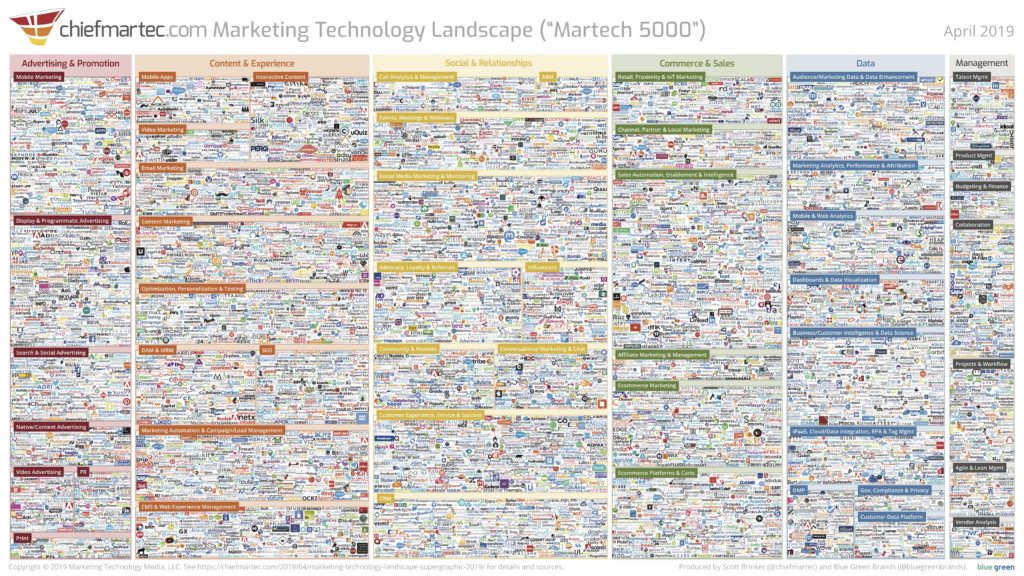
Previously, he was the co-founder and CTO of ion interactive, a software company that provides marketers with a platform for creating and testing interactive content, and he helped run a successful web development agency, which — among other things — built most of the web marketing infrastructure for Citrix.
Add to that a BS in computer science from Columbia University, an MBA from MIT, and a master’s degree in computer science from Harvard University — and you’ve got one intimidated interviewer. Well, I should have been intimidated, but he’s so goddamn nice about everything that I was mostly just excited.
In this interview, which we’ve condensed and lightly edited for clarity, we cover a wide range of marketing technology topics, including privacy, two-way marketing, and how Scott would take over the world if he were a VP at Google.
Read on to discover some whip-smart answers about marketing technology from one of the best in the business.
Let’s start with the basics, What is your name? What is your role? Where do you work?
Scott Brinker. I work at HubSpot as the VP of Platform Ecosystem. I’m also the editor of the chiefmartec.com blog, and the Program Chair for the MarTech Conference.
You have chiefmartec. You have the MarTech Conference. How does it all work together for you?
The connecting thread there is it’s all about this huge martech ecosystem. With chiefmartec, it’s actually interesting. Although I’m known for that crazy diagram that keeps trying to chart and keep track of all these different vendors out here, actually my main mission with it was much more on the human side of like, I’m fascinated by these people in the marketing organization who are taking responsibility for creating these stacks and managing them, and operating them, and in some ways the tech ecosystem that those folks are using. It’s one of the things that feeds into why their job is so challenging and fun and adventurous and crazy.
It’s helping that community get together so they can learn from each other. To be honest, I feel very fortunate, to even be a part of that. When I go to MarTech, actually, I’m in sort of the same mode as every other attendee, which is, I’m really interested to hear: How is Aetna thinking about how they manage this? How does Netflix run A/B testing on marketing campaigns? I’m learning as much as anyone else.
I’ve come to HubSpot with a very strong philosophy that this is just a world where one company isn’t going to do it all, right? The future of not just martech, but really the whole idea of the front office that connects all these systems has a lot of different specialists. I think there’s a role for companies like HubSpot and Salesforce and Adobe and Oracle, and these sort of larger, almost tent-pole systems, where they can provide a foundation and almost a rationalization mechanism, to make sure there’s a common system record, a common data structure. This is what David Raab is very excited about with CDPs in general.
Then the idea is they have to become incredibly open, so that all these other specialist apps can plug into these platforms. Some of them specialize in a particular functionality, like managing influencer marketing. Some of them are going to become increasingly specialist in vertical markets like nonprofits. Part of what I do with HubSpot is evangelizing that internally and sort of externally. How do you make this a really open system that it’s not just HubSpot? It’s HubSpot and this whole collection.
The second thing where the overlap would be is just knowing the martech landscape and being able to reach out like, “Wow. We should really get a partnership with these people. Wouldn’t it be awesome if these folks integrated HubSpot and helped nudge things in that way, too?”
What is the difference with marketing technology for, let’s say, an organization that’s doing 20 million in revenue, and an organization like Netflix, which is doing billions? You think about a big company: They have marketing operations. They have a VP of Marketing Tech. When you think about a 10 million dollar company, they have a marketer. How do they cross that chasm, or how do you prepare that marketer to be more successful?
That’s a brilliant question. This is actually where the tension is, because in some ways, this explosion that’s happening in technology is an incredible equalizer for small businesses. There’s a lot of technology out here now that’s incredibly sophisticated and, quite frankly, isn’t that expensive. All the competition in the martech space does exactly what you’d expect a highly competitive market to do. It eventually starts pushing prices down. Maybe companies don’t need to get a multi-million dollar Watson solution from IBM to start to leverage some machine learning in my marketing. There’s affordable things they could get for under $200 a month.
I think on the one hand, martech’s been this incredible democratizing force of being able to empower smaller and mid-size businesses — in theory, having the equivalent technological capabilities as companies that are at the enterprise scale.
I think the flip side is exactly what you mentioned. The enterprises have the benefit that they can hire specialist talent to really understand how they take advantage of this technology.
I think the challenge for these smaller businesses is that they don’t have a VP of Marketing Tech and Operations. This is where there’s interesting solutions that the market’s trying to solve. In some cases, you actually do get the one marketer happens to be — in I think increasingly more of these companies — pretty darn tech savvy. That’s becoming an advantage. If you’re a tech savvy marketer, you’ve got a lot of opportunity.
The other thing is the vendors in the space recognize the segment, and they’re realizing they have to package their machine learning for market solution for small businesses because they’re not going to have a data scientist looking through different models here. They need to simplify it. Even if that means cutting down some of the flexibility, it’s actually about making it more accessible to that particular segment. I think across the entire martech landscape, you can see vendors that clearly are making that trade-off saying, “How do we simplify this to go after the SMB?”
The third piece, which I know you guys are familiar with, too, is the role of service providers. They say, “Okay, maybe I don’t need to have a martech stack expert on my staff, but if I’m working with a service provider who is almost my fractional chief marketing technologist, they’re going to help me get the right stack set up. Initially, they’re going to help me put in the right monitoring places. They’re going to come in and do regular check-ups for me.” That can also be sufficient for me getting to the next level I need to be at.
What scares you the most about marketing technology? What worries you about even your marketing tech that you’re working with?
There’s the devil we know and the devil we don’t and we should. The one that we know, but we still seem to underestimate, is the ratio between talent and technology. Buying technology like this is a relatively new thing for marketers, so they don’t always ask the right questions to really understand: “What is the true cost of this going to be? What investment do I have to match to really get success with this?”
I think we’re coming around to the realization that it’s like an 80/20 rule thing where it might be 20% the technology, but you’re not making 80% investment in having the talent, enabling the talent, giving them time to experiment, to learn. That’s the thing I see a lot of companies wrestle with. They buy the technology and they don’t have a plan yet for how to enable the team to take advantage of it.
The devil that they don’t know, necessarily, or I fear that few of them think a lot about is — it’s all stuff around compliance and security. For a very long time, the martech stack, in many ways, grew up outside traditional IT governance. There were a lot of good reasons for that. The truth was, IT just wasn’t incentivized or interested or oriented in a way to move fast enough to help give marketers the capabilities they needed to stay competitive.
Unfortunately, as one of the negative side effects of that has been, this really making sure we’re evaluating products from a security perspective, a compliance perspective. GDPR, I think, was a real wake-up call for the marketing world in general. Like, “Wait. We can’t just do whatever we want with data whenever we want it? This is illegal? What?” We’re still working through that. I’m confident — maybe confident is the wrong word — I’m optimistic that over the next several years, our profession collectively will get a lot better at having good governance around security and compliance. Today, I feel like that’s a bit of a blind spot, a bit of a weak spot.
Obviously we have the things that scare us with marketing technology, but we also have the things that excite us. What is the most exciting part of marketing technology for you?
There’s a lot happening across the whole spectrum, so pick your pet rock. If you’re an analytics person, oh my God, what’s happening in analytics is incredible. I think my pet rock is the idea that for the longest time, marketing was a one-way communications vehicle. We create these amazing things in communications, but it just sort of gets broadcast out. What happens next? That’s the sales department. That’s the support department.
The technology now is a place where — whether it’s through social media, or whether it’s through more interactive services that we’re driving on our website, or things like the chat bot — all of a sudden, marketing now is not just a one-way stream of communications or content. It’s this two-way active engagement. And I think we’ve only begun to scratch the surface of how to leverage those capabilities creatively.
On the other end of the spectrum, you’ve got these technologists and product people who have created all these amazing new ways to let you interact dynamically with individuals, but they don’t necessarily have the marketing vision of: “Well, how would you weave that into some overarching narrative? How do you make this a part of your brand?” I think these two communities are starting to — really in the scheme of things, just starting to — come together to creatively think about how to build this in a way that communicates something to the world, that creates a brand unlike anything anyone else has ever seen.”
I know this sounds a bit abstract, so let me give it some really concrete examples. I think a lot of these direct-to-consumer companies are really starting to pioneer this idea that brands are going to be tied in to this end-to-end experience of how you interact with our website, how you interact with our app. I feel like we are at the beginning of this journey. You look into the distance and you’re like, “Oh my goodness, there’s going to be a renaissance of just enormous proportions.”
There’s like two colleges out of the 2,000 that are teaching Google Analytics. Google Analytics has been around forever. But you don’t find it in any marketing program, period. When you think about that skills gap, we have all this marketing technology, have all these people that are going to be coming on to the workforce, how do we close that skills gap?
I think there’s a few ways to look at this. There are certainly things the universities have to take responsibility for closing the gap on. What’s interesting is I think there’s actually a strong partnership opportunity with the industry, too. I mean, it surprises me actually that Google hasn’t been more proactive in getting Google Analytics taught in universities. My God, if I’m the Google product manager, this is my strategy for world domination.
I mean, Adobe did that.
Yeah, so I think there’s a lot of opportunity for that to get sorted out. Part of it is this isn’t just a problem for new people entering the field. One of the things that makes this field so exciting and terrifying at the same time is the rate of change is just insane. If I was at the top of my game in 2009, the best in the world at all the technologies at that point, but then I never changed another thing, I would be absolutely terrible today. I’d be like, “Chat bot? Who needs a chat bot?” Human beings, genetically, we resist change, it’s really hard for individuals. It’s much harder for organizations. This is actually the skill we need to work on. It’s not just about teaching Google Analytics, it’s teaching them how to learn things, like Google Analytics, and then how to learn the thing that’s going to replace Google Analytics because something will.
Interesting. I’ve worked with a ton of developers in my career. One of the things I’ve always learned from them is when they go to school, they’re not being taught how to just use this one language. They’re being taught how to solve problems. That was something that will help them get through their career, because you’re never going to just write PHP. You’re going to write PHP now, then it’s going to become Rails, then it’s going to become Node, then you’re going to move on to something else, and now the whole world is JavaScript, as an example. That was something that the developers were taught.
From my viewpoint, I don’t see that happening on the marketing and business side nearly as much as I would on the developers side. Would you say that’s because with developers it’s been so technology-focused for the past 20 years compared to marketers where it’s very new?
Yeah. You know, it’s interesting because there is an argument in the other direction. I’ve said this a lot that one of the things that makes marketing so challenging is it’s actually not that our old skills and requirements have gone away and now we have to learn this whole new set, it’s worse than that. All those old skills and principles are still largely true. I need to be able to understand my audiences. How do I segment them? How do I manage pricing? How do I manage positioning? All that shit stays relevant as it ever was.
Before when I figured that out, there was a relatively narrow set of channels and delivery mechanisms I would use for communicating around that. Now, for me, that’s the beginning of the journey of this explosion of all these possible ways to engage with people. The scope of my responsibilities is not just arts and crafts department. It’s very much end to end, life cycle touch point, measuring that whole experience.
I think there’s an argument to be made that those fundamentals of marketing that are independent of the technology are still really important to teach. Yeah, maybe I’m coming around to saying exactly what you did, just less eloquently, which is, if I’m getting a degree in computer science, it’s not that I’m learning specific languages. I’ll have to build things in specific languages because I have to get shit done, but what they really teach are things like, you need to know algorithms. You need to know discrete mathematics. You need to be able to understand when we talk about machine learning. Those principles are helpful, but then when it comes time to actually getting stuff done, you have to go out and learn how you’re going to write a program in JavaScript. I’m not going to give you a lecture on that.
A few years ago, developer boot camps started coming out, and they were 12-week, 8-week, 6-week courses. What you’re saying is all the things that we need to know in marketing still apply. Maybe there needs to be some change in the pedagogy on how we teach marketing overall. However, maybe there’s another opportunity for a boot camp–style course, very much like a developer boot camp — for marketing operations.
Would you see that being an opportunity for the skills gap?
I think one of the things that makes it a little bit different than the developer ecosystem is in the developer ecosystem, you have to think about specific languages. There really isn’t a vendor associated with them, or at least most of them. I guess maybe Apple has their language for iOS. But if I want to learn JavaScript or I want to learn Python, it’s not like the Python organization is the place that does this. It’s really an open market. When you get into martech, a lot of what people need to learn in the actual hands-on operations is configuring or getting value out of Salesforce or HubSport. What you’ve seen is all of these major vendors, I think Salesforce has been really aggressive with it, with their whole Trailhead education program. I know here at HubSpot, the HubSpot Academy has been a big force. It’s not just feeding a man a fish, it’s teaching the man how to fish.
You could argue that there aren’t a lot of these certifications and learning tracks, but they’re mostly aligned with an individual vendor’s tool set. Yeah, maybe somewhere between what I learn in college around marketing and what an individual vendor will teach me, there’s this set of stuff that’s a little more vendor independent, but it’s more technical. It’s more hands-on than the college stuff. I’m not quite sure where you go for that. You can come to the MarTech Conference, but that’s only two days.
Is it valuable to have someone teach how to think about marketing automation, or how you should look at a marketing automation platform (a MAP). These are the ways that you can think about it, because Pardot, Marketo, HubSpot, Autopilot, they all do relatively the same thing. The tactics and strategies are all relatively the same, and new strategies come to the market. Does the framework need to be taught, or should it be more vendor-centric?
No, I think there’s a real value to that. The way vendors teach this varies a lot. In some of these certifications, it’s really about understanding the tool. At HubSpot Academy, they’ve actually leaned further in the other direction, not just teaching them about HubSpot, but teaching them how you do good inbound marketing. Which, you could quite frankly take and apply on many marketing automation system you wanted. I think there is high variance from one vendor’s education program to another because it really comes down to what is their go to market strategy around this. Could this be a market where independent instructors and boot camps or schools, or things like that, could bring a lot of value? I think the answer is yes.
The same thing that makes this hard for individuals I think also just makes this hard for anyone who’s been trying to aggregate a solution for all of them, which is just the landscape just constantly keeps changing.
For example this whole conversational marketing thing, just a couple years ago, no one was talking about that. Now it’s like, “What’s the whole curriculum, the playbook, on how to teach people how to be great conversational marketers?” Shit, I don’t even know if this thing’s been written yet.
I think Drift just published a book about it, so we’ll have to see what that says.
Going back to something you said earlier was the compliance factor and GDPR and privacy. Privacy and GDPR are not only important to the vendor, but they’re also important to the marketer. And neither side is holding either side accountable or making sure we don’t burn the house down that we live in. Like Facebook is having issues right now. Who is trying to go in and make sure that we don’t burn the house down?
Yeah, that’s a great question. I think there’s the legal question to it, and then there’s sort of the market answer to it. I mean, the legal question is like … this is why this stuff’s so scary, right? Anyone who touches it ends up with some kind of legal liability. I mean, the customer who’s running the stuff, that they’re using it, they’re liable. If a vendor is knowingly enabling this stuff, they become liable. It’s going to become a very dangerous regulatory environment for people to just not pay any attention.
When you think about that regulatory environment, when would that be?
It actually already started. We’re now seeing the GDPR filing …
What about America? America is the can-spam country. You can spam me. You just have to give me an opportunity to get out of it. When do we think the states is maybe going to get smarter?
Clearly, California is trying to do it. We’ll see what the pushback is from industry on that. Here’s the thing, I actually do feel this is an opportunity more than a threat, because at the end of the day, consumers don’t like having their data breached. They don’t like having stuff that feels like people are selling their data without their permission. The stuff around privacy, we’ve taken a lot of it for granted, but my opinion is that the reason why there hasn’t been greater consumer pushback isn’t because consumers understand what’s happening, and they’re fine with it.
It’s that they just haven’t understood what’s actually happening. As they get more visibility into that, they’re like, “Well, no. I don’t like that.” In fact, this is why I install my ad-blocker and why we’ve got a fricken huge percentage of people that now run ad-blockers.
To me, I think this is an opportunity for the vendors more than anyone else. We go back to that beleaguered marketer who has all these things they’ve been worrying about for good marketing. Then we’re like, “Oh, one more thing. On top of that, do you mind understanding this 3,000-page volume of regulations?” They’re just like — crap! — you know.
I think this is going to be an opportunity where vendors, from a software technology perspective, should be able to help solve this — certainly it’s the certifications of our software, but I think from a platform ecosystem perspective, too.
I think one of the things HubSpot would want to do is help make sure our ecosystem partners adhere to a certain level of these new regulations as well. In fact, that almost becomes one of the benefits: if you buy HubSpot and then you get to install certified applications from our ecosystem, we will basically be able to say these things are also going to live up to the same level of compliance.
Is that going to be something in part of your role? You have all these databases of everybody else. Your compliance and your standards are on a massive scale that not many other people would compete with, so if you set that same standard with somebody else, that makes you, in essence, the person that’s responsible for setting the compliance standards. Is that a thought that HubSpot has, is we need to set a standard for all those vendors, yet?
I think HubSpot’s official position on this is still open. My personal opinion is I think that’s an opportunity for companies like HubSpot. It’s going to be hard for anyone to solve this, but the vendors at the center of this stuff, we can probably solve it more efficiently than any other approach of everyone having to solve it off in their own little silos and each other’s silos constantly breaking, and who’s keeping track of all that stuff? I don’t know exactly how far down that road we can go before, at some point, the benefit we can offer is counterbalanced by how much risk and liability we can actually guarantee when we don’t technically control all the third parties in the ecosystem. There’s really hard questions there, but I guess what I feel is that’s a road worth pushing on. How far can we go down that? How much can we help make this easier so the average marketer doesn’t have to read through 50 different SLA agreements? They’re not going to do it. It’s a mess.
There’s so many new tools coming out. We’re looking at over 1,000 tools a year. If you had to say there were five things you should do when you’re looking for a new tool, or you’re trying to understand tools, what advice would you give a marketer?
It’s not looking for the perfect tool. It’s satisficing. I have a need, and I find a tool that does that for me, and the fact that I might not evaluate every one of the 500 variations of that tool out there, I should be able to sleep at night. What matters is, Did the vendor I pick do what I needed them to do? I want to understand, does it work with my other products? Is there an ecosystem symmetry there?
Do you think that when you pick a tool that integration is a big part of that decision?
I think it is, and I think it will be increasingly even more so. Does this stuff integrate with the other things I have? Are they GDPR compliant? That’s now something I care about. There’s the business risk. How stable is this company? How long have they been around? What sort of financing do they have? What’s my belief that this is something that’s going to be around a year or two from now? It’s not that every tool has to cross that bar. It may be for certain tools you’re looking to do something that’s a little more transactional. It’s a little more experimental. It’s like, “Yeah, I’m going to try this. I’m going to do this. If it works, it’s great. If not, I’m not committed to this for being a multi-year thing.”
There are other tools where you want to get it right. If it’s my customer support management system, I don’t want to be in a position where a year from now I have to swap that out. I think the customer service side of this is huge. This is why the G2 Crowds and the TrustRadiuses, this review-based culture has become a powerful element of this.
Don’t worry about the perfect tool, but have a good framework for evaluating the vendors that you do pick.
When you think about all these new tools that are out there, how does the hiring process need to change to get qualified candidates that can really run these stacks?
Again, not all systems are equal. If you have a certain foundational platform at the heart of your stack, you’re probably going to want to get someone who either has experience with that, or has a certification from a vendor.
I guess a better question would be, how do you identify talent that has that? How do you source people that know how to use Autopilot, for example?
I’m not sure there are great universal ways to do that. For a particular tool, most of those that are strong, they have community forums. They have user groups. You basically can go to places where almost it’s a self-selection by the people who are participating in those communities, participating in those user groups. I think that at some level, once you get past those major platforms, frankly it’s less about having someone who’s experienced with that tool, and have someone who’s just demonstrated they actually can learn multiple tools and new tools quickly. “What’s the last six tools you worked with over the past year? Show me what you do with them.” See how people do it.
It’s an interesting way to look at it. If they have variety, it obviously tells you that they have the technology chops to get used to new tools.
Any questions for me, or anything I should have been asking?
Okay. I guess my question to you would be, If you could pick one thing as the biggest barrier that you see marketers running into with this stuff, what would it be?
They don’t know how the internet works. I think at the end of the day, I’m very lucky because I worked at a company like codeschool.com, which was a leader educator of developers. I was surrounded by engineers. I understand what client side and server side means. I understand what an identity is compared to an anonymous user. If I say, “anon,” all the developers in the room know who I’m talking about. Marketers really lose that.
The most foundational thing for marketers to understand is the concept of taxonomy and schema. I definitely bring that from my time at Kissmetrics and all the different analytics providers. Really, the way that I got into stack was the fact that I always thought about analytics. Well, I’ve got all these keys of information. Then we would pull that data out of analytics and then import it into Mailchimp to send dynamic emails. It was never like we have taxonomy for Mailchimp, but it was like, we have taxonomy for our analytics tool. We have a schema. Let’s make sure it lines up with our other tools. Let’s make sure that we use the same naming across these six different tools.
They don’t have a universal language for their stack. The marketer doesn’t know how the internet works, and then there’s no taxonomy for them to make all these things actually work together and for it to make sense. In an organization that breaks down between marketing, sales, development, customer success, you have the same action being called nine different things.
That makes sense. I’m as guilty as anyone. It’s like I fall into this trap of this distribution curve where it’s the upper 10% or 20% of people who are really into this stuff — they’re pushing it and they’re like you and they understand it. I hang out with a lot of those people, so my image of where the state of understanding is for this stuff is ridiculously skewed compared to where people in marketing are still at. Certainly from my perspective, I know I don’t do enough to reach out to that larger audience like, “Hey. First thing you do, rip up this crazy landscape. Let’s just talk some simple stuff. Come. Don’t be scared.”
That’s really interesting. I made a six and a half hour online course for how do you build a stack, how do you think about it, because we noticed a huge knowledge gap. I see it growing larger and larger as the industry continues to evolve. I think it’s an interesting problem to solve. I don’t think there’s any one solution. I’m surrounded by a lot of people who understand this stuff. Then I get thrown into a random conversation with a medium-sized company that you would expect would know this stuff, but then you’re like, “Oh yeah, but why would they? Why should I expect them to know that?” That’s unfair the way that I think sometimes I look at it.
Thanks to Scott Brinker for being such an excellent interviewee, and for his interesting thoughts on balancing people and technology, privacy, two-way communication with customers, technology integrations, and the MarTech skills gap. I hope you learned as much as I did.
If you want to learn more about Marketing Technology, take Dan McGaw’s comprehensive Marketing Technology Stack course. This comprehensive 8-class course will help you evaluate, select, and integrate the tools that will drive growth for your business.
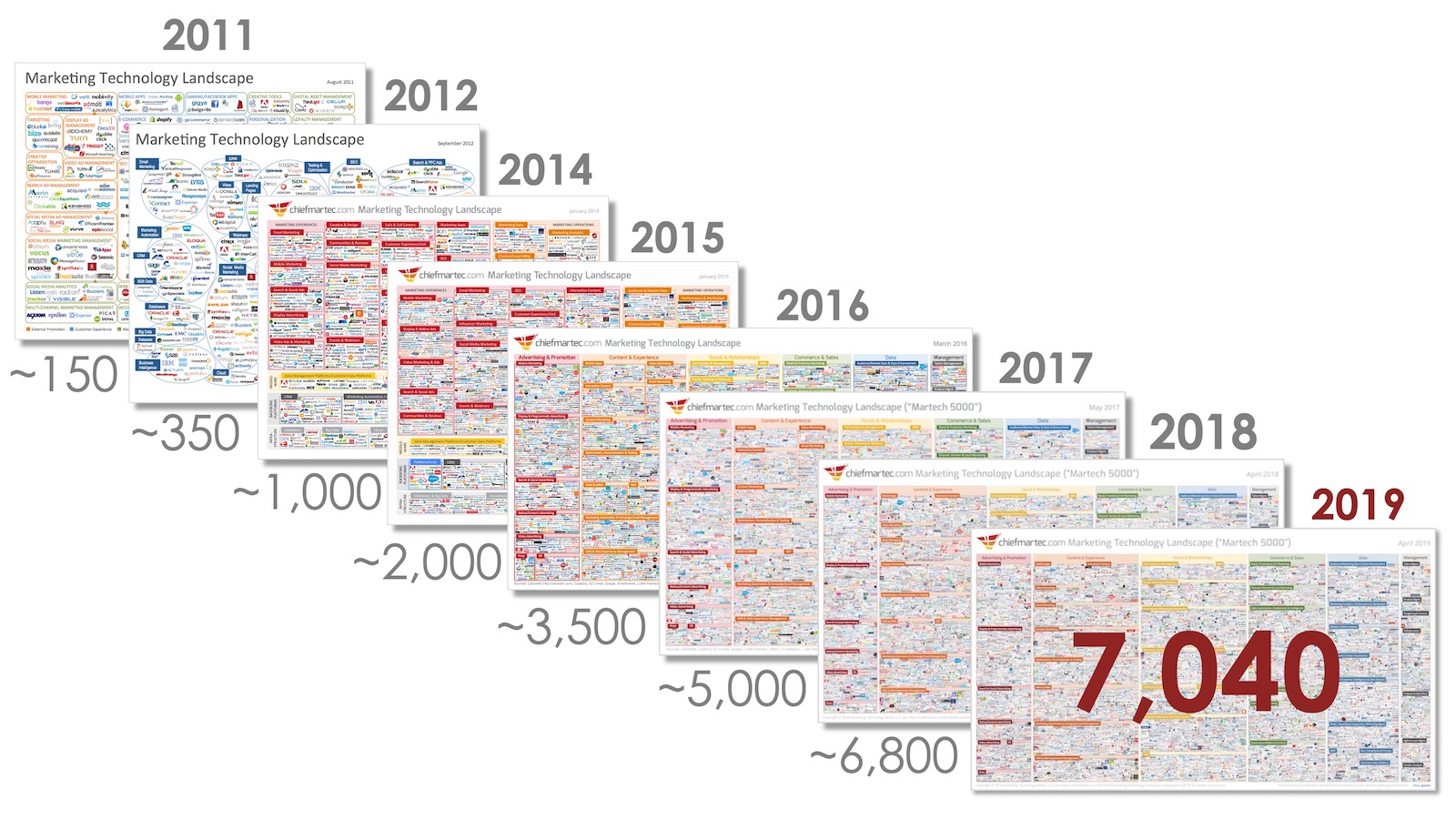
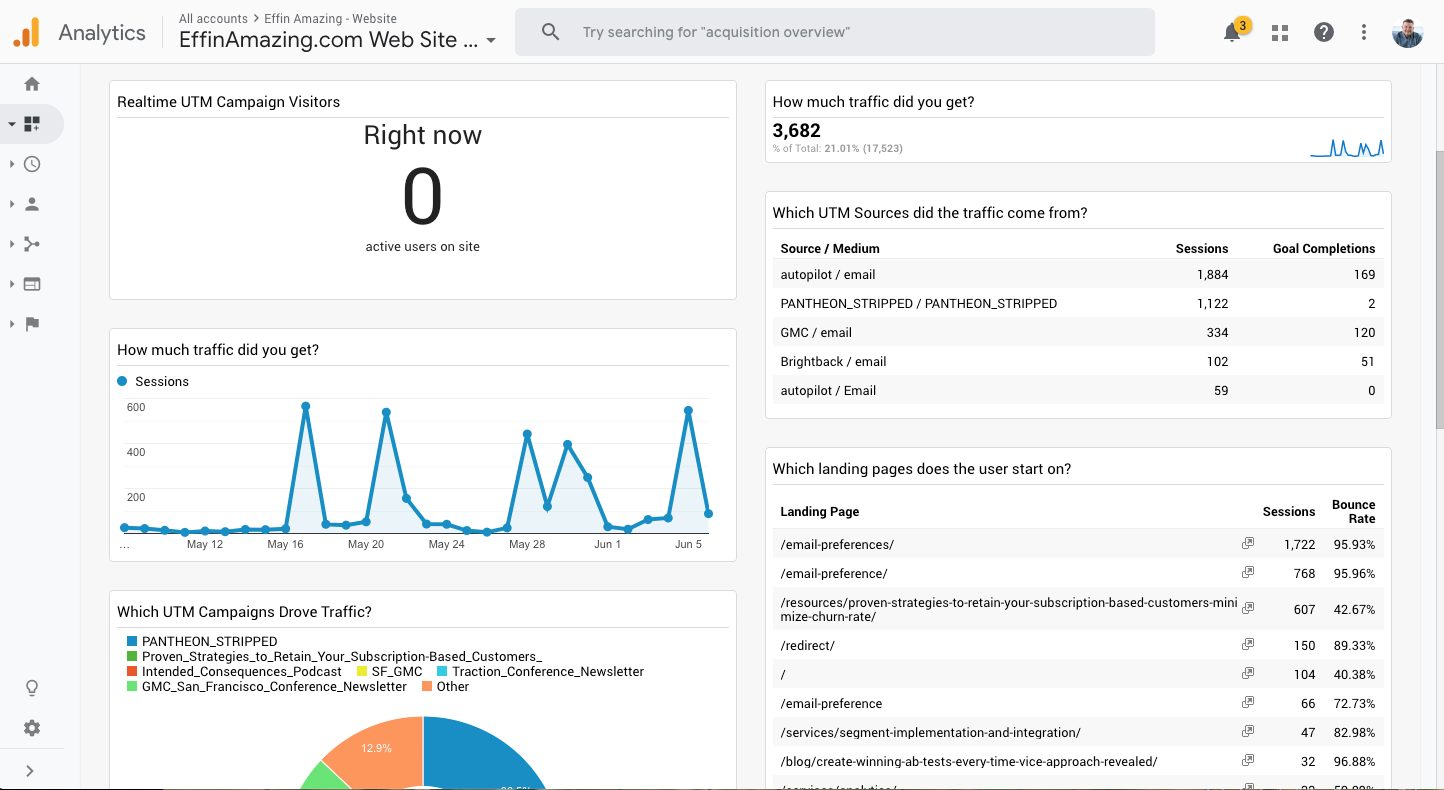

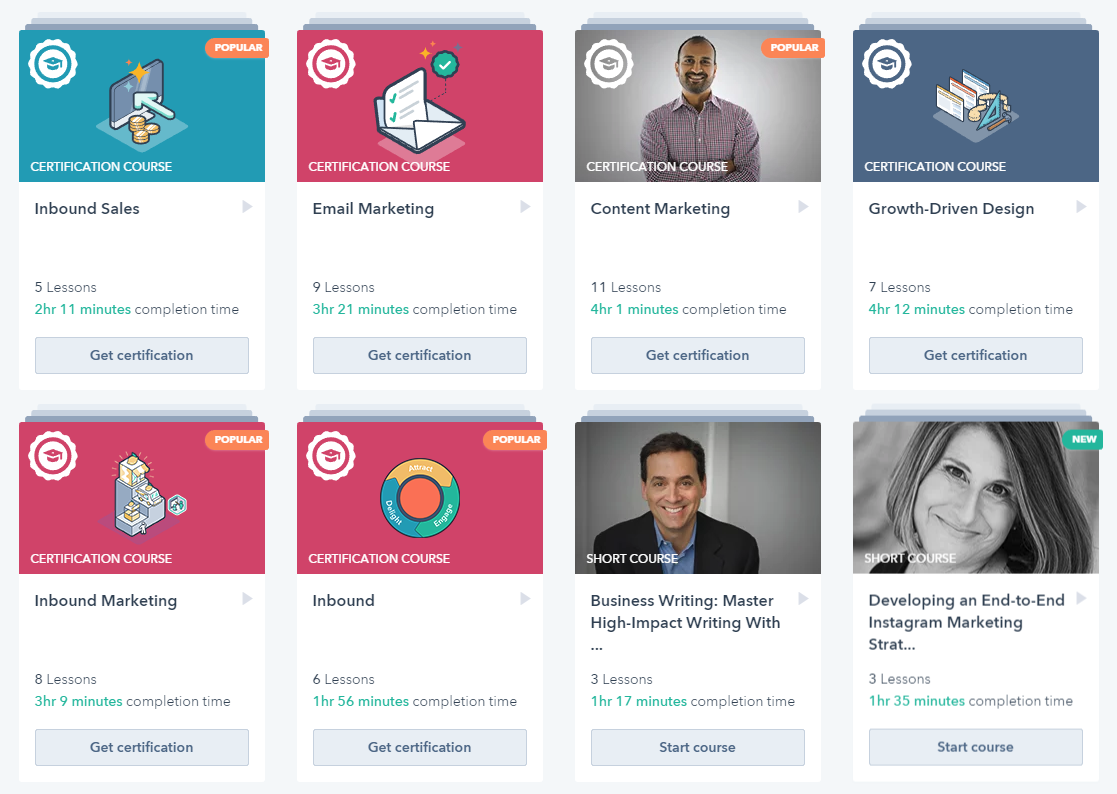
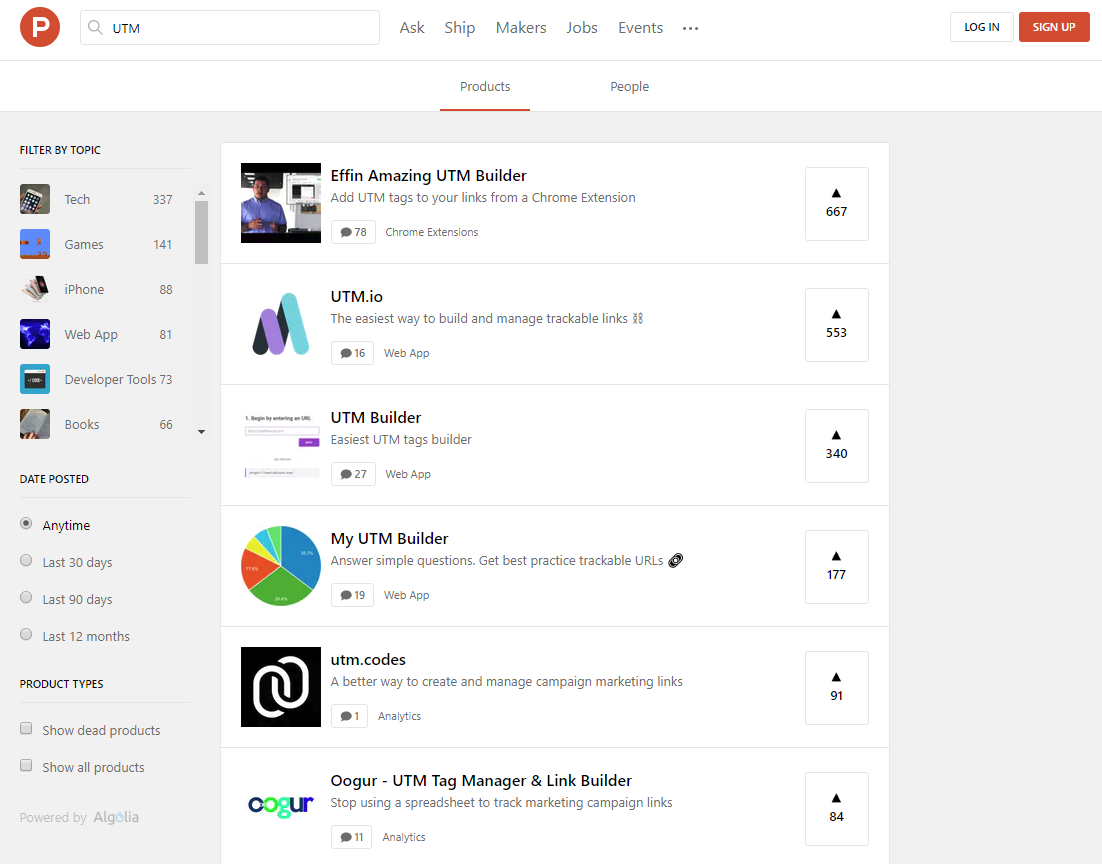
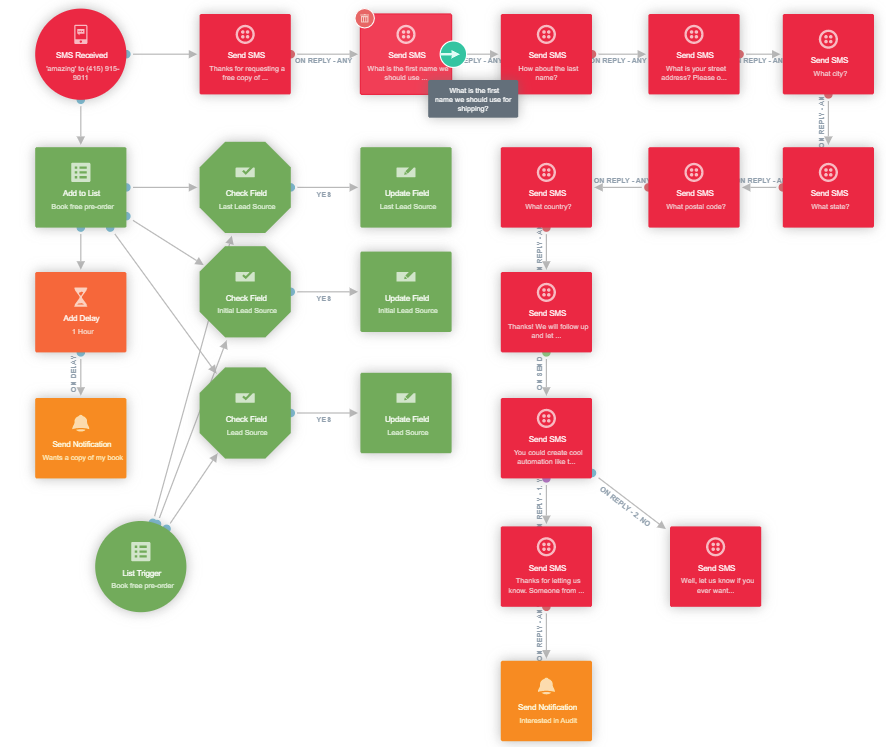
Leave a Reply